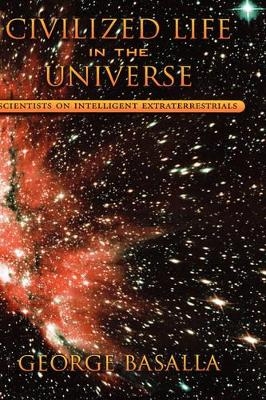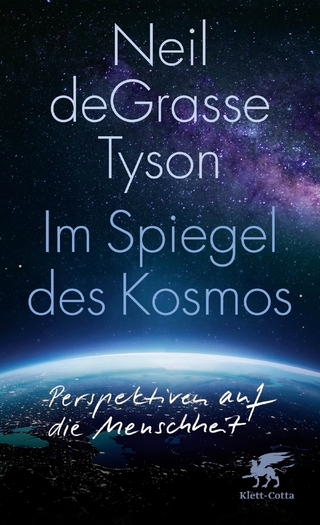
Civilized Life in the Universe
Scientists on Intelligent Extraterrestrials
Seiten
2006
Oxford University Press Inc (Verlag)
978-0-19-517181-5 (ISBN)
Oxford University Press Inc (Verlag)
978-0-19-517181-5 (ISBN)
Presenting a history of scientific speculation about intelligent extraterrestrial life, the author traces the influence of one speculation on the next, showing a chain of ideas passed from one scientist to the next, and from science to popular culture. He even traces the influence of popular culture on science.
This book is a selective and fascinating history of scientific speculation about intelligent extraterrestrial life. From Plutarch to Stephen Hawking, some of the most prominent western scientists have had quite detailed perceptions and misperceptions about alien civilizations: Johannes Kepler, fresh from transforming astronomy with his work on the shape of planetary orbits, was quite sure alien engineers on the moon were excavating circular pits to provide shelter; Christiaan Huygens, the most prominent physical scientist between Galileo and Newton, dismissed Kepler's speculations, but used the laws of probability to prove that "planetarians" on other worlds are much like humans, and had developed a sense of the visual arts; Carl Sagan sees clearly that Huygens is a biological chauvinist, but doesn't see as clearly that he, Sagan, may be a cultural/technological chauvinist when he assumes aliens have highly developed technology like ours, but better.
Basalla traces the influence of one speculation on the next, showing an unbroken but twisting chain of ideas passed from one scientist to the next, and from science to popular culture. He even traces the influence of popular culture on science--Sagan always admitted how much E. R. Burroughs' Martian novels influenced his speculations about Mars. Throughout, Basalla weaves his theme that scientific belief in and search for extraterrestrial civilizations is a complex impulse, part secularized-religious, and part anthropomorphic. He questions the common modern scientific reasoning that life converges on intelligence, and intelligence converges on one science valid everywhere. He ends the book by agreeing with Stephen Hawking (usually a safe bet) that intelligence is overrated for survival in the universe, and that we are most likely alone.
This book is a selective and fascinating history of scientific speculation about intelligent extraterrestrial life. From Plutarch to Stephen Hawking, some of the most prominent western scientists have had quite detailed perceptions and misperceptions about alien civilizations: Johannes Kepler, fresh from transforming astronomy with his work on the shape of planetary orbits, was quite sure alien engineers on the moon were excavating circular pits to provide shelter; Christiaan Huygens, the most prominent physical scientist between Galileo and Newton, dismissed Kepler's speculations, but used the laws of probability to prove that "planetarians" on other worlds are much like humans, and had developed a sense of the visual arts; Carl Sagan sees clearly that Huygens is a biological chauvinist, but doesn't see as clearly that he, Sagan, may be a cultural/technological chauvinist when he assumes aliens have highly developed technology like ours, but better.
Basalla traces the influence of one speculation on the next, showing an unbroken but twisting chain of ideas passed from one scientist to the next, and from science to popular culture. He even traces the influence of popular culture on science--Sagan always admitted how much E. R. Burroughs' Martian novels influenced his speculations about Mars. Throughout, Basalla weaves his theme that scientific belief in and search for extraterrestrial civilizations is a complex impulse, part secularized-religious, and part anthropomorphic. He questions the common modern scientific reasoning that life converges on intelligence, and intelligence converges on one science valid everywhere. He ends the book by agreeing with Stephen Hawking (usually a safe bet) that intelligence is overrated for survival in the universe, and that we are most likely alone.
George Basalla is Professor of History at the University of Delaware (Emeritus).
1. Trio of Ideas ; 2. Life on the Moon ; 3. From the Moon to the Planets ; 4. The Ascension of Mars ; 5. Percival Lowell: Champion of Canals ; 6. Mars Unveiled ; 7. Carl Sagan: Mars and Beyond ; 8. Life in an Expanding Universe ; 9. The Trajectory: CETI to SETI to HRMS ; 10. Mirror Worlds ; 11. Afterword ; Sources of Quoted Material ; Bibliography
| Erscheint lt. Verlag | 23.2.2006 |
|---|---|
| Zusatzinfo | 3 halftones, 28 line drawings |
| Verlagsort | New York |
| Sprache | englisch |
| Maße | 238 x 178 mm |
| Gewicht | 562 g |
| Themenwelt | Sachbuch/Ratgeber ► Natur / Technik ► Weltraum / Astronomie |
| Naturwissenschaften | |
| ISBN-10 | 0-19-517181-0 / 0195171810 |
| ISBN-13 | 978-0-19-517181-5 / 9780195171815 |
| Zustand | Neuware |
| Haben Sie eine Frage zum Produkt? |
Mehr entdecken
aus dem Bereich
aus dem Bereich
die Suche nach der Urkraft des Universums
Buch | Hardcover (2023)
Klett-Cotta (Verlag)
25,00 €
Perspektiven auf die Menschheit
Buch | Hardcover (2024)
Klett-Cotta (Verlag)
25,00 €


